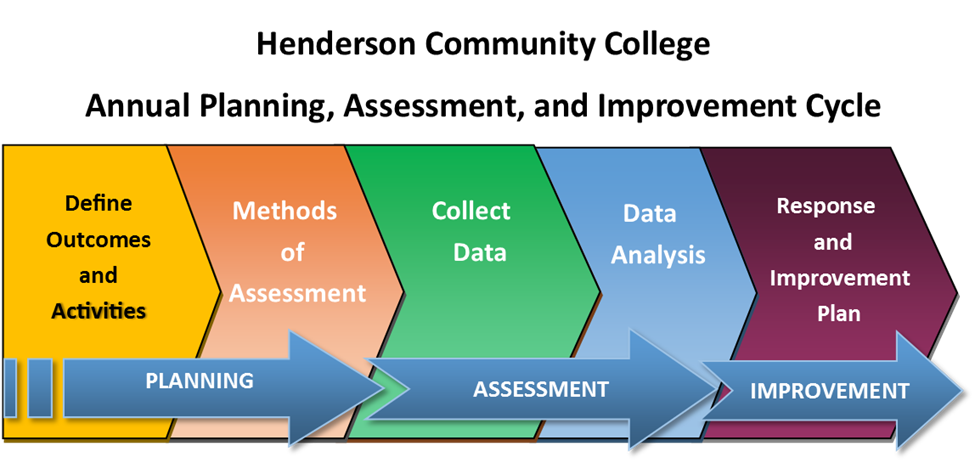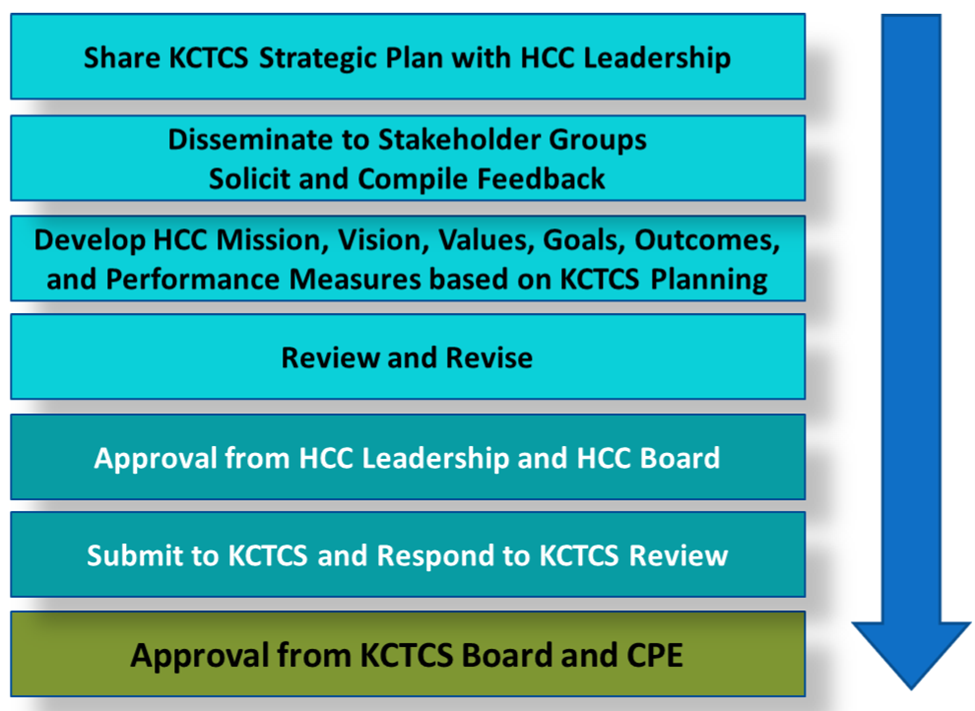
Assessment Plan
The Henderson Community College (HCC) Assessment Plan describes the process used to ensure that the College and its organizational units are working effectively to achieve the vision, mission, values, and goals of the college and the college system in which we function.
Vision
The vision of Henderson Community College is to be the area's educational leader providing opportunities for academic growth, workforce development, and community enrichment.
Mission
The mission of Henderson Community College is to enhance the quality of life and employability of our communities by serving as the leading provider of
- College and Career Readiness
- Transfer and Technical Education
- Workforce Development
- Lifelong Learning and Community Enrichment
Henderson Community College, a member of the Kentucky Community and Technical College System, is a public associate degree granting institution serving Northwest Kentucky.
Values
The values of Henderson Community College are:
- Academic Freedom
- Access and Opportunity
- Accountability and Integrity
- Community Partnerships
Institutional Goals
- Increase Learner Success
- Increase Employment Success
- Increase Organization Success
aNNUAL Planning, assessment, and Improvement cycle

Planning, assessment and improvement is an ongoing process that involves gathering information from the internal and external college environment and using this information for improvement. The strategic planning of the college may be influenced by changes that occur locally, statewide, nationally and even internationally.
The planning, assessment and improvement cycle at (HCC) has five components that are reflected in the unit reports of academic programs and organizational areas of the college. The five components of the assessment plan are as follows:
- Define outcomes and improvement activities
- Determine methods of assessment and set performance measures
- Set performance measures and collect data
- Analyze the data and determine results
- Determine needed improvements for the next planning cycle and identify needed resources
Definitions
Unit refers to the various functional departments of the college, such as:
- Academic Affairs
- Business Affairs
- Student Affairs
- Institutional Advancement
- Technology Solutions
- Workforce Solutions
- Library Services
- Institutional Effectiveness-Institutional Research
- Professional Development
- and the sub-units of each of these organizational components.
Outcomes refer to the direct evidence of student learning demonstrated by a student at the completion of his/her academic program/course, or to an outcome desired by an organizational unit that is not directly linked to student learning.
Activities describe action that is taken to achieve the desired outcomes.
Assessment Method refers to direct and indirect approaches selected by programs, courses of study and operational units, to determine the extent to which each outcome has been attained.
Performance Measure is the benchmark or standard identified by the program or department that is used to determine improvement or decline with the outcome.
Data refers to the compiled information used during analysis to determine whether or not outcomes were met.
Analysis is the systematic appraisal of the data in the context of the program, course of study, or operational unit.
Response refers to improvement strategies needed to address gaps in attainment of outcomes.
Planning and Reporting by Academic Program, Division or Department of the College
The planning, assessment, and improvement process is performed annually and reported through Campus Labs Planning. An outline of the process is provided below.
Identify specific outcomes and a performance standard, target, or benchmark, for each outcome in this planning cycle. State performance standard, target, or benchmark as annual, intermediate, or long-term, if these differ.
List the specific activities that will be undertaken in support the objectives to achieve the desired outcomes and performance standards, targets, or benchmarks of the unit.
Identify the direct and indirect assessment methods that will be used for evaluation purposes and the person or group responsible for data analysis.
Include the results, or attach/link the data. To what degree was the performance standard, target, or benchmark met?
Given the results reported for this year and considering all factors that may have contributed to these outcomes, what do you conclude?
What changes are needed to help the unit improve and achieve its performance standard, target, or benchmark? What will be needed in terms of resources?
What changes are needed to help the unit improve and achieve its performance standard, target, or benchmark? What will be needed in terms of resources?
The Integration of assessment activities
Planning and assessment at HCC is both annual and long-term, and is based on the mission, vision, values and goals of the College. These components, along with outcomes and performance measures, constitute the majority of HCC’s strategic plan, and are consistent with those of the Kentucky Community and Technical College System (KCTCS) of which HCC is a member. KCTCS revises its strategic plan in accordance with Kentucky state law every six years, and HCC also adheres to this schedule. Outcomes and performance measures for KCTCS and HCC are reviewed and adjusted on a bi-annual basis to accommodate the development schedule of the Kentucky state budget. The diagram below shows how planning and assessment is integrated between the two institutions.

Planning and Assessment Integration Between KCTCS and HCC
- Share KCTCS Strategic Plan with HCC Leadership
- Disseminate to Stakeholder Groups and Solicit and Compile Feedback
- Develop HCC Mission, Vision, Values, Goals, Outcomes, and Performance Measures based on KCTCS Planning
- Review and Revise
- Approval from HCC Leadership and HCC Board
- Submit to KCTCS and Respond to KCTCS Review
- Approval from KCTCS Board and CPE
The unit review process and the college assessment and accreditation team
Chief Officers, the Director of Knowledge Management, Division Chairs and other designated leaders review and guide unit managers and program coordinators through the planning, assessment and reporting process. All HCC academic and non-academic units complete their annual reporting obligations in Campus Labs Planning by May 31st. Unfinished reports resulting from mid-year resignations are completed by the immediate supervisor of the vacated position.
Beginning September 1, the College Assessment and Accreditation Team (CAAT) reviews all strategic planning reports in Campus Labs Planning to ensure that the College and its units are operating in an effective manner.
The duties of the College Assessment and Accreditation Team during the review process include:
- Review the college’s mission statement and goals along with the local outcomes, performance measures and targets to ensure consistency with student learning assessment initiatives.
- Evaluate assessment activities for academic programs, professional and adult education programs, and student support services.
- Integrate planning and the assessment process by connecting goals of KCTCS to HCC, its units and individual employees.
- Promote campus-wide assessment activities to improve learning outcomes.
- Establish an assessment schedule for academic programs, professional and adult education programs, and student support services. Align the assessment schedule to be compatible with KCTCS, SACSCOC, and discipline accreditation schedules.
- Evaluate assessment reports of academic programs and student support units using a scoring rubric. Identify areas which are consistently falling short of the desired performance measures and suggest possible remedies for improving results and strengthening assessment process to the appropriate personnel.
- Support the program coordinators of accredited programs by performing tasks such as proof reading accreditation report narratives, assisting with site visit logistics, and helping with accreditation recommendations and suggestions as needed.
- Coordinate the accreditation reports prepared by the institution including decennial, substantive changes, and 5th year interim reports for SACSCOC
- Make recommendations for funding expanded assessment activities throughout the College.
- Review and update the HCC Assessment Plan.
Suggestions concerning the planning, assessment and improvement process generated by HCC stakeholders are considered by the CAAT along with the Office of Knowledge Management.
Recommendations for changing this process are submitted by the CAAT to the HCC Leadership Team for consideration.
Composition of the college assessment and accreditation team
- Academic Dean
- Director of Knowledge Management
- Library
- Division Chair
- SACSOC Liaison (currently Dir. of KM)
- Chief Business Officer
- Program Coordinator/Faculty
- Faculty
- Dean of Enrollment Management
The focus of assessment
The primary focus of activities for the assessment of student learning outcomes will be at the academic program level. Faculty will determine the learning outcomes for students, prescribe discipline-specific curricula, and construct the means for determining that students have achieved the student learning outcomes using Campus Labs.
Assessment of activities related to academic and student-support services is at the unit level where managers and staff determine the desired outcomes for the services they provide, define assessment methodology, and develop initiatives to improve these services.
Assessment at the program and unit level is augmented by assessment initiatives directed by the President through the President’s Cabinet, Leadership Team, Committees, Ad Hoc Workgroups, or special initiatives like College’s Quality Enhancement Plan.
Evidence-based Decision-Making
Evidence gathered through assessment activities are to be used in the following ways:
- Faculty members use the evidence to update and improve curriculum, either in content or methodology.
- Degree programs use the data in periodic program accreditation or reviews, and ongoing curriculum development to ensure that program outcomes for student learning are being met.
- Professional staff members use the information to modify existing services or to create new approaches for delivering services to students.
- Leadership at the college uses the information to set priorities for resource allocations and to monitor the contribution of programs and services to the mission and goals of the institution.
- Administrators use the evidence to assess the quality of the degree programs, support services, and the effectiveness of the college in achieving its goals.
